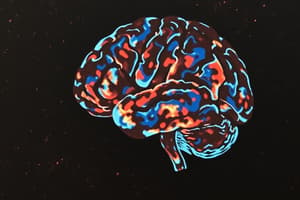Podcast
Questions and Answers
What is the primary focus of the various branches of psychology?
What is the primary focus of the various branches of psychology?
- Exploring cultural anthropology
- Studying brain evolution
- Understanding artificial intelligence
- Analyzing cognitive capacities (correct)
Which field studies cognitive processes at lower levels of organization?
Which field studies cognitive processes at lower levels of organization?
- Cognitive psychology
- Cognitive linguistics
- Developmental psychology
- Neuroscience (correct)
Which branch is NOT explicitly mentioned as part of the interdisciplinary connections?
Which branch is NOT explicitly mentioned as part of the interdisciplinary connections?
- Cognitive ethology
- Cognitive neuroscience
- Behaviorism (correct)
- Ethology
Which of the following is a new interdisciplinary branch that connects these sciences?
Which of the following is a new interdisciplinary branch that connects these sciences?
What do cognitive psychologists primarily focus on?
What do cognitive psychologists primarily focus on?
Which of the following statements about cognitive science branches is true?
Which of the following statements about cognitive science branches is true?
Which of the following is a subfield of anthropology that intersects with cognitive studies?
Which of the following is a subfield of anthropology that intersects with cognitive studies?
Who is considered the principal promoter of functionalism in psychology?
Who is considered the principal promoter of functionalism in psychology?
Functionalism views mental states as which of the following?
Functionalism views mental states as which of the following?
What does cognition broadly refer to in the context of psychology?
What does cognition broadly refer to in the context of psychology?
Which discipline is responsible for discovering how cognitive programs are implemented in the brain?
Which discipline is responsible for discovering how cognitive programs are implemented in the brain?
According to functionalism, how can mental states be understood?
According to functionalism, how can mental states be understood?
In cognitive psychology, which of the following is typically considered a distinct cognitive system?
In cognitive psychology, which of the following is typically considered a distinct cognitive system?
What does the assumption of distinct cognitive systems imply for psychological research?
What does the assumption of distinct cognitive systems imply for psychological research?
Who primarily established the foundations of psychology as a scientific discipline?
Who primarily established the foundations of psychology as a scientific discipline?
What best defines the primary focus of cognitive psychology?
What best defines the primary focus of cognitive psychology?
Which branch of psychology would primarily study how cognitive abilities develop over time?
Which branch of psychology would primarily study how cognitive abilities develop over time?
Neuroscientists believe that information processing in the brain is largely conducted by which units?
Neuroscientists believe that information processing in the brain is largely conducted by which units?
What was the main goal of structuralism in psychology?
What was the main goal of structuralism in psychology?
What is the primary focus of cognitive sciences?
What is the primary focus of cognitive sciences?
Which of the following is NOT a principal branch of psychology?
Which of the following is NOT a principal branch of psychology?
Which of the following disciplines primarily investigates neural activity related to cognitive processes?
Which of the following disciplines primarily investigates neural activity related to cognitive processes?
How is psychology primarily organized according to the given framework?
How is psychology primarily organized according to the given framework?
What distinguishes social psychology from other branches of psychology?
What distinguishes social psychology from other branches of psychology?
What distinguishes psycholinguistics from linguistics?
What distinguishes psycholinguistics from linguistics?
Which branch of neuroscience focuses on the connection between neuron populations and cognition?
Which branch of neuroscience focuses on the connection between neuron populations and cognition?
Which discipline's interest lies in the social dimensions of cognition?
Which discipline's interest lies in the social dimensions of cognition?
How do cognitive sciences view the relationship between the mind and materialism?
How do cognitive sciences view the relationship between the mind and materialism?
Which aspect of cognition is NOT a primary focus of the disciplines mentioned?
Which aspect of cognition is NOT a primary focus of the disciplines mentioned?
What do computer scientists in cognitive sciences primarily focus on?
What do computer scientists in cognitive sciences primarily focus on?
In which way do philosophers contribute to cognitive sciences?
In which way do philosophers contribute to cognitive sciences?
Flashcards
Cognitive Sciences
Cognitive Sciences
The study of the mind and its processes, encompassing a variety of disciplines.
Cognition
Cognition
The process of information processing within the nervous system.
Materialistic View of the Mind
Materialistic View of the Mind
The view that the mind is entirely physical and can be scientifically studied.
Goal of Cognitive Sciences
Goal of Cognitive Sciences
Signup and view all the flashcards
Psychology's role in Cognitive Sciences
Psychology's role in Cognitive Sciences
Signup and view all the flashcards
Linguistics' role in Cognitive Sciences
Linguistics' role in Cognitive Sciences
Signup and view all the flashcards
Neuroscience's role in Cognitive Sciences
Neuroscience's role in Cognitive Sciences
Signup and view all the flashcards
Anthropology's role in Cognitive Sciences
Anthropology's role in Cognitive Sciences
Signup and view all the flashcards
Psychology
Psychology
Signup and view all the flashcards
Neuropsychology
Neuropsychology
Signup and view all the flashcards
Philosophy of Mind
Philosophy of Mind
Signup and view all the flashcards
Cognitive Linguistics
Cognitive Linguistics
Signup and view all the flashcards
Neuroscience
Neuroscience
Signup and view all the flashcards
Psycholinguistics
Psycholinguistics
Signup and view all the flashcards
Brain Evolution
Brain Evolution
Signup and view all the flashcards
Cognitive Psychology
Cognitive Psychology
Signup and view all the flashcards
Personality Psychology
Personality Psychology
Signup and view all the flashcards
Social Psychology
Social Psychology
Signup and view all the flashcards
Comparative Psychology
Comparative Psychology
Signup and view all the flashcards
Developmental Psychology
Developmental Psychology
Signup and view all the flashcards
Structuralism
Structuralism
Signup and view all the flashcards
Functionalism
Functionalism
Signup and view all the flashcards
William James
William James
Signup and view all the flashcards
Faculty Psychology
Faculty Psychology
Signup and view all the flashcards
Functional Organization
Functional Organization
Signup and view all the flashcards
Cognitive Neuroscience
Cognitive Neuroscience
Signup and view all the flashcards
Study Notes
Neuroscience and Cognitive Sciences
- Cognitive science is an interdisciplinary field focused on the mind's nature.
- Cognition is defined as neuro-information processing.
- Cognitive science contrasts with some philosophical views by treating the mind as a material entity that is scientifically understandable.
- The goal is to collect empirical evidence and form theories explaining mental processes from various disciplines like psychology, linguistics, and neuroscience.
- Psychologists use behavioral evidence (language, decisions, social interactions, emotions) to understand the mind.
- Linguists analyze how people create and understand meaningful language.
- Neuroscientists investigate neural activity during cognitive processes using advanced technology.
- Anthropologists study cognition in various cultural contexts.
- Cognitive science draws on philosophy, psychology, linguistics, computer science, neuroscience, and anthropology.
Fields of Study
- Each discipline uses unique techniques, tools, and perspectives to study the mind at different levels.
- Linguists model linguistic competence (language structure) and psychologists analyze the mechanisms behind language use.
- Neuroscientists study brain function in detail, while computer scientists develop models and simulations of cognitive abilities.
- Anthropologists investigate the cultural influences on cognition, unlike philosophers, who primarily focus on theoretical models of "how the brain creates the mind."
The Level of Organization
- Psychology examines cognition at a high level of organization, focusing on human cognitive capacities within cognitive domains.
- Neuroscience studies cognitive processes at the lower level of the CNS.
- Psychology's areas often overlap neatly with cognitive domains (social and linguistic domains).
Branches of Psychology
- Psychology encompasses various branches that differ in their focus on aspects of human behavior.
- Some include: cognitive, personality, social, comparative, and developmental psychology, among others.
- Psychological domains are organized horizontally rather than vertically in terms of levels.
Branches of Neuroscience
- Neuroscience subfields directly reflect the brain levels of organization.
- Neuroscientists mainly focus on populations of neurons rather than individual neurons during information processing.
- Local circuits, within the brain, are a primary focus of study.
- Connectionist networks frequently represent a key area of computational modeling.
Binding Sciences
- Structuralism (early psychology) focuses on the mind's structure by breaking it down into basic elements.
- Wilhelm Wundt was a key figure in structuralism.
- Functionalism contrasts structuralism by focusing on the mind's processes (actions) rather than its contents to understand why people behave and think the way they do.
- William James is a prominent functionalist.
Functionalism
- Functionalism views the mind as a functional organization of the brain.
- Mental states are functional states.
- Cognitive science tasks include understanding mental programs and determining how they relate to brain function.
- Mental states can be instantiated in different kinds of physical substrates beside the brain (like a computer).
Cognition
- Cognition is essentially neuro-information processing.
- The different disciplines using "information" often refer to varying aspects of information, ranging from format to transformation.
- Cognitive psychology models mind organization based on distinct faculties (memory, attention).
Reference
- Relevant works by Bermúdez and Goldstein offer broader context for the topic.
Studying That Suits You
Use AI to generate personalized quizzes and flashcards to suit your learning preferences.



